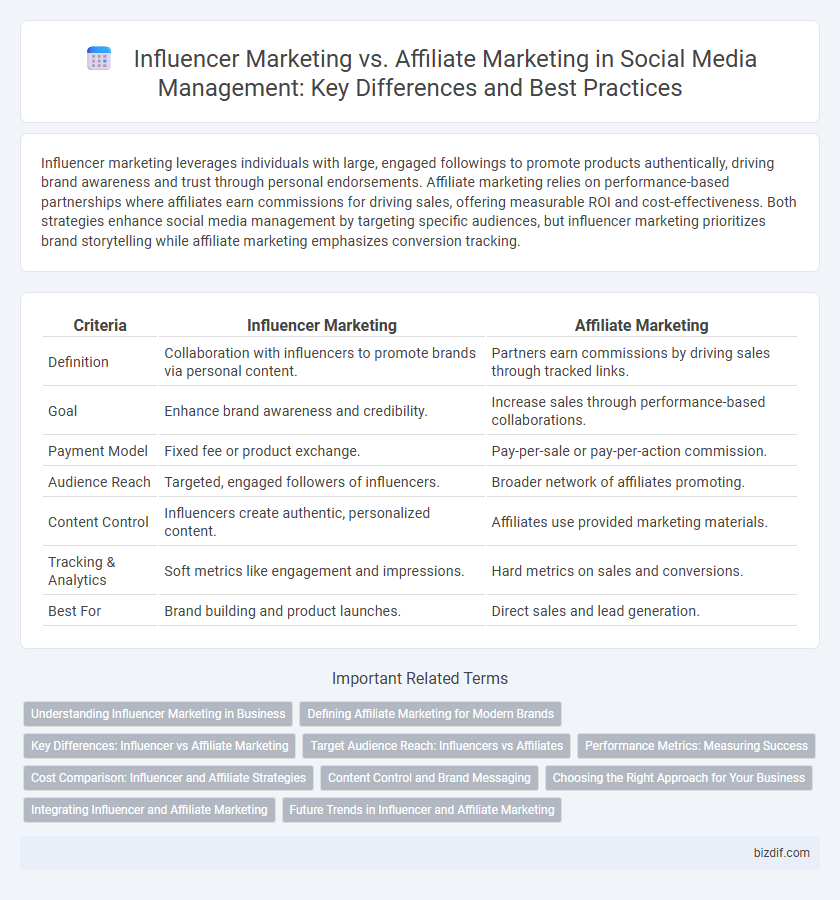Influencer marketing leverages individuals with large, engaged followings to promote products authentically, driving brand awareness and trust through personal endorsements. Affiliate marketing relies on performance-based partnerships where affiliates earn commissions for driving sales, offering measurable ROI and cost-effectiveness. Both strategies enhance social media management by targeting specific audiences, but influencer marketing prioritizes brand storytelling while affiliate marketing emphasizes conversion tracking.
Table of Comparison
| Criteria | Influencer Marketing | Affiliate Marketing |
|---|---|---|
| Definition | Collaboration with influencers to promote brands via personal content. | Partners earn commissions by driving sales through tracked links. |
| Goal | Enhance brand awareness and credibility. | Increase sales through performance-based collaborations. |
| Payment Model | Fixed fee or product exchange. | Pay-per-sale or pay-per-action commission. |
| Audience Reach | Targeted, engaged followers of influencers. | Broader network of affiliates promoting. |
| Content Control | Influencers create authentic, personalized content. | Affiliates use provided marketing materials. |
| Tracking & Analytics | Soft metrics like engagement and impressions. | Hard metrics on sales and conversions. |
| Best For | Brand building and product launches. | Direct sales and lead generation. |
Understanding Influencer Marketing in Business
Influencer marketing leverages individuals with established online followings to promote products or services, creating authentic connections with target audiences through personalized content. This strategy enhances brand visibility and trust by harnessing influencers' credibility and engagement rates on platforms like Instagram, TikTok, and YouTube. Compared to affiliate marketing, influencer marketing emphasizes relationship-building and creative storytelling, driving both brand awareness and customer loyalty effectively.
Defining Affiliate Marketing for Modern Brands
Affiliate marketing for modern brands involves partnering with content creators who promote products through tracked links, generating commissions only on actual sales or leads. This performance-based strategy ensures brands pay for measurable results, enhancing budget efficiency and ROI. It differs from influencer marketing by emphasizing direct conversion metrics over general brand awareness or engagement.
Key Differences: Influencer vs Affiliate Marketing
Influencer marketing leverages individuals with substantial social media followings who promote products through authentic content and personal endorsements, driving brand awareness and engagement. Affiliate marketing relies on performance-based partnerships where affiliates earn commissions for sales generated via unique tracking links, emphasizing measurable ROI and direct conversions. Key differences include influencer marketing's focus on brand storytelling and audience trust versus affiliate marketing's data-driven sales generation and reward structure.
Target Audience Reach: Influencers vs Affiliates
Influencer marketing excels in expanding target audience reach through authentic content delivered by creators with niche followings, fostering trust and engagement. Affiliate marketing leverages performance-based partnerships, relying on affiliates to drive conversions through targeted promotion but often with a narrower, transaction-focused audience. Brands prioritize influencer campaigns for brand awareness and affiliates for measurable sales-driven impact within specific market segments.
Performance Metrics: Measuring Success
Influencer marketing success is primarily measured through engagement rates, follower growth, and brand sentiment analysis, reflecting the reach and impact of sponsored content. Affiliate marketing relies heavily on conversion metrics such as click-through rates, sales generated, and return on investment (ROI) to evaluate performance. Both strategies require detailed tracking tools to analyze performance and optimize campaigns for maximum effectiveness.
Cost Comparison: Influencer and Affiliate Strategies
Influencer marketing typically involves higher upfront costs due to fees paid to content creators for brand promotion, often ranging from hundreds to thousands of dollars per post depending on follower count and engagement rates. Affiliate marketing operates on a performance-based model, where businesses pay commissions only when sales or leads are generated, resulting in lower fixed costs and improved ROI tracking. Brands aiming for scalable, cost-effective solutions often favor affiliate programs, while influencer campaigns are preferred for targeted brand awareness despite higher initial investment.
Content Control and Brand Messaging
Influencer marketing offers brands less direct control over content as influencers generate authentic, personalized posts that resonate with their audience, enhancing brand perception through genuine storytelling. In contrast, affiliate marketing provides brands greater control over brand messaging, with affiliates primarily promoting pre-approved content and offers, ensuring consistency and alignment with marketing strategies. Both approaches impact brand visibility differently, with influencer marketing emphasizing emotional connection and affiliate marketing focusing on performance-driven results.
Choosing the Right Approach for Your Business
Influencer marketing leverages popular personalities to build brand awareness through authentic content, while affiliate marketing drives sales by rewarding partners for each conversion. Selecting the right approach depends on your business goals: prioritize influencer marketing for brand visibility and affiliate marketing for performance-based ROI. Analyzing target audience behavior, budget allocation, and campaign objectives ensures an effective social media management strategy.
Integrating Influencer and Affiliate Marketing
Integrating influencer marketing with affiliate marketing amplifies brand reach by leveraging influencers' authentic engagement alongside performance-based affiliate sales tracking. Influencers create genuine content that drives trust, while affiliate programs provide measurable ROI through commission-based incentives. Combining these strategies enables businesses to harness influencer credibility and affiliate efficiency, optimizing social media management outcomes.
Future Trends in Influencer and Affiliate Marketing
Influencer marketing is evolving with increased emphasis on authentic micro-influencers who drive higher engagement and trust, while affiliate marketing leverages AI-driven data analytics to optimize commission models and target audiences more effectively. Emerging trends highlight the integration of influencer content directly into e-commerce platforms, increasing conversion rates through seamless shopping experiences. The convergence of influencer and affiliate marketing strategies is expected to enhance personalized marketing, improve ROI tracking, and foster deeper consumer-brand relationships.
Influencer marketing vs Affiliate marketing Infographic

 bizdif.com
bizdif.com